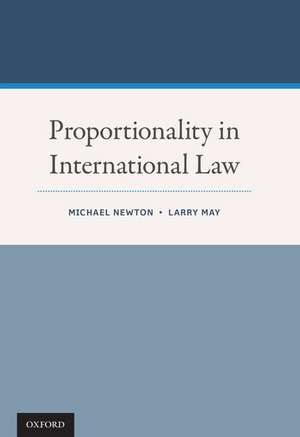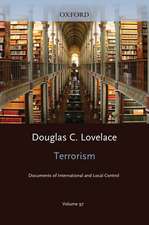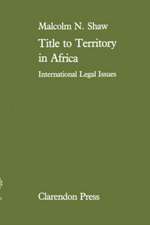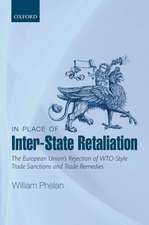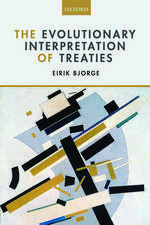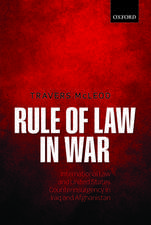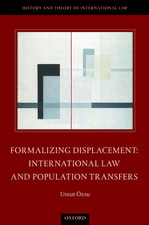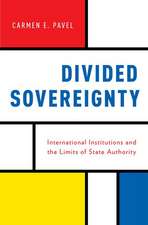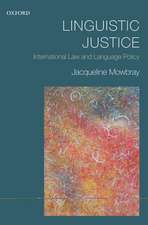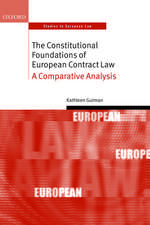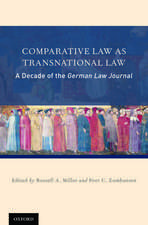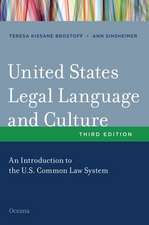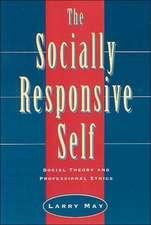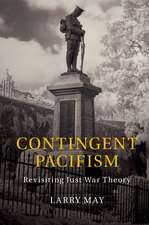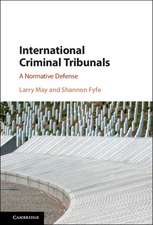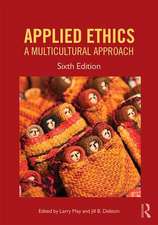Proportionality in International Law
Autor Michael Newton, Larry Mayen Limba Engleză Paperback – 13 noi 2014
| Toate formatele și edițiile | Preț | Express |
|---|---|---|
| Paperback (1) | 486.23 lei 31-37 zile | |
| Oxford University Press – 13 noi 2014 | 486.23 lei 31-37 zile | |
| Hardback (1) | 818.86 lei 31-37 zile | |
| Oxford University Press – 15 mai 2014 | 818.86 lei 31-37 zile |
Preț: 486.23 lei
Preț vechi: 621.19 lei
-22% Nou
Puncte Express: 729
Preț estimativ în valută:
93.04€ • 97.40$ • 76.98£
93.04€ • 97.40$ • 76.98£
Carte tipărită la comandă
Livrare economică 26 martie-01 aprilie
Preluare comenzi: 021 569.72.76
Specificații
ISBN-13: 9780199355051
ISBN-10: 0199355053
Pagini: 339
Dimensiuni: 155 x 231 x 23 mm
Greutate: 0.52 kg
Editura: Oxford University Press
Colecția OUP USA
Locul publicării:New York, United States
ISBN-10: 0199355053
Pagini: 339
Dimensiuni: 155 x 231 x 23 mm
Greutate: 0.52 kg
Editura: Oxford University Press
Colecția OUP USA
Locul publicării:New York, United States
Recenzii
There are few topics in the law governing conflict more complicated and elusive than proportionality. Accomplished international lawyers struggle to grasp the important difference between application of the concept in the law of self-defense and international humanitarian law. Contemporary means and methods of warfare such as cyber-attack and the use of voluntary human shields have exacerbated the complexity modern decision-makers and warfighters face when addressing real-world proportionality issues. Professors Newton and May have skillfully teased apart international law's variants of proportionality in a manner that is both accessible and sophisticated. Of particular note is their interdisciplinary approach and use of real-world examples. I commend this work to scholars and practitioners alike.
Proportionality is a doctrine that every serious student of military force needs to study and understand. Its dynamics and tensions are remarkably consistent even as the specific details are so varied. Newton and May captured those issues superbly. Their organized and well-reasoned analysis gives this book an impressive depth of application and insight. Their conclusion that proportionality during armed conflicts is a unique usage highlights one of the enduring conundrums of our era. This book fills the current void with intellectual consistency. It contains an interdisciplinary discussion that will help practitioners apply the doctrine of proportionality in a manner consistent with the concerns of military commanders, and that also preserves lives.
Proportionality is a pervasive concept in modern law and philosophy. Newton and May confront the danger that familiarity with the term makes its use formulaic and often flawed. The authors' careful interdisciplinary approach dissects the myriad concerns related to the modern practice of proportionality, and provides an invaluable analytical template for decision-makers. This book should be required reading for any military expert, international judge, constitutional lawyer, human rights advocate, legislator, theologian, or philosopher who seeks to remain fully informed on the most important debates of our era.
There are few topics in the law governing conflict more complicated and elusive than proportionality. The authors have skillfully teased apart international law's variants of proportionality in a manner that is both accessible and sophisticated. Of particular note is their interdisciplinary approach and use of real-world examples. I recommend this work to scholars and practitioners alike.
Proportionality is a doctrine that every serious student of military force needs to study and understand. Its dynamics and tensions are remarkably consistent even as the specific details are so varied. Newton and May captured those issues superbly. Their organized and well-reasoned analysis gives this book an impressive depth of application and insight. Their conclusion that proportionality during armed conflicts is a unique usage highlights one of the enduring conundrums of our era. This book fills the current void with intellectual consistency. It contains an interdisciplinary discussion that will help practitioners apply the doctrine of proportionality in a manner consistent with the concerns of military commanders, and that also preserves lives.
Proportionality is a pervasive concept in modern law and philosophy. Newton and May confront the danger that familiarity with the term makes its use formulaic and often flawed. The authors' careful interdisciplinary approach dissects the myriad concerns related to the modern practice of proportionality, and provides an invaluable analytical template for decision-makers. This book should be required reading for any military expert, international judge, constitutional lawyer, human rights advocate, legislator, theologian, or philosopher who seeks to remain fully informed on the most important debates of our era.
There are few topics in the law governing conflict more complicated and elusive than proportionality. The authors have skillfully teased apart international law's variants of proportionality in a manner that is both accessible and sophisticated. Of particular note is their interdisciplinary approach and use of real-world examples. I recommend this work to scholars and practitioners alike.
Notă biografică
Michael Newton is Professor of the Practice of Law at Vanderbilt University Law School. He formerly taught at the United States Military Academy at West Point and at the Judge Advocate General's School and Center. Professor Newton has written extensively about use of force issues, international jurisprudence, and the enforcement of international law. His co-authored work, Enemy of the State: The Trial and Execution of Saddam Hussein (with Michael Scharf) won book-of-the-year honors from the American Section of International Association of Penal Law. He also won Article of Year honors in 2011 for his article entitled Evolving Equality: The Development of the International Defense Bar, published in the Stanford Journal of International Law.arry May is the W. Alton Jones Professor of Philosophy, Professor of Law, and Professor of Political Science at Vanderbilt University. He has published over thirty books, including book length studies of each of the fours crimes under the ICC's jurisdiction. His books have won awards in philosophy, law, and international relations. He has also published extensively on the history of the Just War tradition, especially on the work of Grotius and Hobbes.
